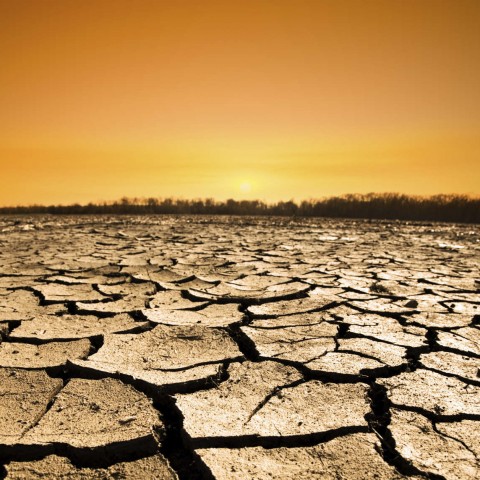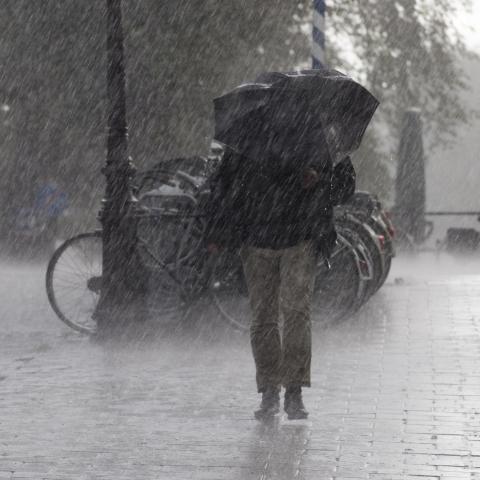Socially, weather can bring us together.
I mean that quite literally, actually—if you’re caught in the rain, you can share an umbrella or duck under an awning with a stranger (while expressing that you’re cold in Arabic!). Or perhaps if it’s a beautiful day, you call up a friend for a bike ride and talk about the nice weather in Arabic.
Or maybe you just need to learn weather terms in Arabic so you can understand the Arab weather forecast!
Have you thought about how you might discuss the weather in Arabic? For example, the weather Dubai United Arab Emirates experiences, or the Arabic weather report you just heard?
Even though the weather is one of the first topics in any language class, most people never realize how rich language can be when you want to describe the natural world.
When learning weather vocab in Arabic, most people get to “It is raining,” and “It is cold,” and stop there. But not you.
Because right here, you’ll learn a ton of different phrases and sentence patterns for talking about weather in Arabic. These will help you swiftly and confidently speak in Arabic about any kind of weather event.
Table of Contents
- Start with Some Questions
- What to Expect Weather-Wise in Different Arab Countries
- Complaining about the Weather
- First Hot, Then Cold
- Weather-Related Natural Events
- Idioms about Weather in Arabic
- How ArabicPod101 Can Help You Master Arabic Conversation
1. Start with Some Questions
It’s pretty logical to begin learning here with some questions. After all, questions and answers form the backbone of any conversation. To start practicing Arabic, all you need to do is ask a question about something nearby, and you’re off and running!
It would be a little weird to ask whether it’s raining or not right now (just open a window or watch an Arabic weather report), so here the most logical way to ask is with the future tense.
- هَل تَظُن أَنَّها سَتُمطِر اليَوْم؟
hal taẓun ʾannahā satumṭir al-yawm?
Do you think it’ll rain today? - هَل سَتَكونُ الحَرارَة عالِيَة اليَوْم؟
hal satakūnu al-ḥarārah ʿaliyah al-yawm?
Is it going to be hot today? - لا, لا أَظُن أَنَّها سَتَكون كَذَلِك.
lā, lā ʾaẓun ʾannahā satakūn kaḏalik.
No, I don’t think it will.
Another really common thing that you should get used to is answering questions about your own background. And since the weather is something that everybody experiences, it’s a common starting point to learn more about somebody else.
- هَل تَسقُط الثُلوج في المَكان الَّذي تَعيشُ فيه؟
hal tasquṭ al-ṯulūǧ fī al-makān allaḏī taʿīšu fīh?
Does it snow where you live? - هَل الجَوْ حار أَم بارِد في المَكان الَّذي تَعيشُ فيه؟
hal al-ǧaw ḥār ʾam bārid fī al-makān allaḏī taʿīšu fīh?
Is it hot or cold where you live?
Personally, I can never be satisfied by giving a simplified answer. Countries are big! So I always say:
- بَعض الأَماكِن ساخِنَة و بَعض الأَماكِن بارِدَة. لَكِنّي أُحِبُّ الطَقسَ هُنا!
baʿḍ al-ʾamākin sāḫinah wa baʿḍ al-ʾamākin bāridah. lakinnī ʾuḥibbu al-ṭaqsa hunā!
Some places are hot and some places are cold. But I like the weather here!
The above response is also a good way to compliment the nice weather in Arabic.
2. What to Expect Weather-Wise in Different Arab Countries
Next up, it’s essential to know the general weather conditions in Arabic. So, what types of weather in Arabic-speaking countries should you expect?
Well, the seasons vary from place to place, and depending on the time of year. That said, talking about the weather and seasons in Arabic is a great way to keep a conversation going (and stay relevant).
Let’s take a quick look at three different Arabic-speaking countries in terms of the weather they usually experience. Consider this a rough, preliminary Arabic weather report! 😉 We’ll also include some Arabic phrases for you to get a head start on your geography!
1- Qatar
Qatar, for starters, has a pretty regular climate across the whole country—which isn’t surprising, as it’s not a huge place.
There are two main seasons: a hot season from April to October (and I mean really hot), and a cooler season from November to March. Most foreign tourists who aren’t acclimated to the heat arrive in January or February to avoid any surprise rainfall that might appear at the end of the year.
Visitors usually head to the long stretches of sandy beaches and coastal resorts during that time. Of course, if you head away from the coast and into the desert, you’ll notice the extreme ranges in temperature that can occur in a single day. All this said, you should definitely know how to talk about hot weather in Arabic.
- قَطَر غالِباً ما تَكونُ حارَّة و جافَّة طول السَنَة
qaṭar ġaliban mā takūnu ḥārrah wa ǧāffah ṭūl al-sanah
Qatar is mostly hot and dry all year.
2- Morocco
When talking about seasons in Arabic-speaking Morocco, it’s generally Mediterranean in climate throughout the year. Cool breezes from the sea do a great job at keeping down summer heat in the coastal cities. There are forests in the mountains and deserts in the lowlands.
- الجَوُّ في المَغرِب رَطِب و مُمطِر قُرب الساحِل.
al-ǧawwu fī al-maġrib raṭib wa mumṭir qurb al-sāḥil.
The weather in Morocco is cool and wet near the coast.
3- Egypt
Egypt shares some features with both Morocco and Qatar, though because of its wider range in geography, there’s a little more variety. The cities on the northern coast are definitely cooler and milder than the rest of the country. In the desert areas to the south, there’s virtually no rainfall; that’s why some of the ancient ruins are so well-preserved. About once every hundred years, there’s even a cold snap and some cities can experience snowfall. Head up into the mountains in Sinai, and you can expect some snow every winter.
- في مِصر, الشَمال رَطِب و الجَنوب حار.
fī miṣr, al-šamal raṭib wa al-ǧanūb ḥār.
In Egypt, the north is cool and the south is hot.
All three of these countries have the mild danger of dusty winds that can come blowing in from the desert regions, making life unpleasant in late spring or summer for anyone caught in a sandstorm. Each country has its own name for this wind, too. In Egypt, this word is خَماسين (ḫamāsīn), and in Morocco, it’s عجاج (Aajaj).
Just recently, the spring of 2019 brought surprisingly cold and wet weather to cities across the Middle East. There was flooding in Tunisia and snow in Saudi Arabia. It just goes to show that you’ve got to be prepared for any kind of conditions!
3. Complaining about the Weather
Want to express dislike for a season in Arabic? When it’s really hot (hot weather in Arabic-speaking countries is unavoidable), really rainy, or really cold, you can often break the ice with a stranger by griping about whatever’s going on meteorologically.
To talk about what you don’t like about a season in Arabic, here’s a set phrase you can use anytime you like:
- أَكرَهُ الذَهاب خارِجاً عِندَما يَكونُ الجَوْ هَكَذا
ʾakrahu al-ḏahāb ḫāriǧan ʿindamā yakūnu al-ǧaw hakaḏā
I really hate going outside when the weather is like this.
In the summer months, you may experience brief, but intense thunderstorms and cloudbursts. Did you remember to bring your umbrella?
- آه, لا! لَقَد نَسيتُ مِظَلَّتي. هَل يُمكِنُني اِقتِراض مِظَلَّتِك؟
ʾāh, lā! laqad nasītu miẓallatī. hal yumkinunī iqtirāḍ miẓallatik?
Oh no, I forgot my umbrella! Can I borrow yours?
Arab culture is very concerned with cleanliness, which can offer you some unique ways of describing the weather in Arabic. In Islam, for instance, you have to wash your feet and perform wodo’ before praying at a mosque. Therefore, in the hot and dusty season in Arabic countries, you’ll definitely be able to complain that you desperately need a shower.
- يُوجَدُ الكَثيرُ مِن الغُبار هُنا! يَجِب عَلَيَّ الذَهابُ إلى المَنزِل لِلاِستِحمام.
yūǧadu al-kaṯīru min al-ġubār hunā! yaǧib ʿalayya al-ḏahābu ʾilā al-manzil lilistiḥmām.
There is so much dust here! I need to go home and shower.
And lastly, it’s important to learn to express yourself when the weather is just too much for your taste. When it’s time to head back to your room and give up for the rest of the day, use this:
- إنَّ الجَوَّ حارٌّ جِدّاً بِالنِسبَةِ لي, لا يُمكِنُني أَن أَتَحَمَّل!
ʾinna al-ǧawwa ḥārrun ǧiddan bilnisbaẗi lī, lā yumkinunī ʾan ʾataḥammal!
It’s too hot for me! I can’t stand it!
4. First Hot, Then Cold
You might think that you won’t need to learn to describe cold weather. But then you’ll be wrong and cold when you get there. Hot weather in Arabic-speaking countries isn’t the only thing you’ll experience. Thus, you should be able to talk about the cold in Arabic.
In order to really help you remember the variety of weather conditions that can appear no matter where you go in the MENA region, here’s a short (and a little sad) story made up of common phrases you can use in your day-to-day life. These should make talking about the weather in Arabic a breeze.
- الجَوُّ رائِع اليَوْم!
al-ǧawwu rāʾiʿ al-yawm!
The weather’s great today! - السَماء صافِيَة و الشَمسُ قَوِيَّة.
al-samāʾ ṣāfiyah wa al-šamsu qawiّah.
The sky is clear and the sun is strong. - هُناكَ بَعض الغُيُوم في السَماء.
hunāka baʿḍ al-ġuyuūm fī al-samāʾ.
There are some clouds in the sky. - السَماء بَدَأَت تُمطِر, لَكِنَّني لَيسَت لَدَيَّ مِظَلَّة.
al-samāʾ badaʾat tumṭir, lakinnanī laīsat ladayya miẓallah.
It’s starting to rain, but I don’t have an umbrella. - إنَّ الجَوَّ بارِد, أُريدُ الذَهاب إلى المَنزِل.
ʾinna al-ǧawwa bārid, ʾurīdu al-ḏahāb ʾilā al-manzil.
It’s cold and I want to go home!
When you learn these, think about how these patterns can be changed to express whatever is actually happening to you. Maybe the weather is actually كارثي (karithi) meaning “terrible” or the sky is ضبابي (dababi) meaning “hazy.”
Now that you have a good idea of how to express that you’re cold in Arabic, let’s move on to natural events!
5. Weather-Related Natural Events
Words for weather in Arabic don’t stop after “hot” and “too hot.” Here are three other types of major weather occurrences that you may end up hearing about or running into, because there can be severe weather in Arabic-speaking countries from time to time.
Flooding
Periods of drought followed by sudden rain can be disastrous. Oftentimes, cities aren’t equipped to deal with particularly heavy rainfall, and the streets fill with water in the blink of an eye. In more rural areas, this can even cause mudslides.
However, it’s the locals who will know for sure. With a lifetime of seeing rains and floods, both serious and mild, they’ll be able to give you a clear answer to this question:
- إنَّها تُمطِر بِشِدَّة, هَل تَظُنُّ أَنَّ هَذا سَيُسَبِّبُ فَيَضاناً؟
ʾinnahā tumṭir bišiddah, hal taẓunnu ʾanna haḏā sayusabbibu fayaḍānan?
It’s raining really hard. Do you think this will create a flood?
Earthquake
Earthquakes are probably the most common natural disaster that happens in Arabic-speaking regions. Fortunately, they’re only rarely serious.
Thanks to a couple of tough lessons learned in the past, new building codes make it totally safe to be in a city during a minor earthquake.
- الزِلزال البارِحَة لَم يَكُن خَطيراً.
al-zilzal- al-bāriḥah lam yakun ḫaṭīran.
The earthquake yesterday wasn’t serious.
Drought
Of course, when you have hot and dry winds and huge swaths of desert in your country, you need to be prepared to combat the occasional drought.
- هَل إنتَهى الجَفاف؟
hal ʾintahā al-ǧafāf?
Has the drought ended yet?
6. Idioms about Weather in Arabic
Since weather is something that’s existed in every culture throughout history, it makes sense that this unifying theme would carry through into idioms. Most people know the English idiom “raining cats and dogs,” but have you ever heard these Arabic ones? You probably won’t hear these on the Arabic weather forecast!
- كُل شِدَّة سَتَهون، الصَبر مُفتاح الفَرَج
kul šiddah satahūn, al-ṣabr muftāḥ al-faraǧ
Every intensity will loosen up; patience is the key to relief.
Another great thing is that weather tends to be relatively predictable the world over, so people often use the same metaphors with the same meanings. It’s not hard to understand why this idiom means “good things will come after hardship.”
- إذا هَبَّتْ رِيَاحُك فاغتَنِمها!
ʾiḏā habaّt riyaḥuk fāġtanimhā!
If a wind blows, ride it!
And when that good thing finally does come, you need to seize the opportunity! However, it’s never good to stake all your fortune on circumstance. Remember…
- تَجري الرِيَاح بِما لا تَشتَهي السُفُن
taǧrī al-riyaḥ bimā lā taštahī al-sufun
Winds blow counter to what ships desire.
In other words, we are always at the mercy of fate.
Now let me put a caveat here. Foreign learners of pretty much every language run the risk of misusing idioms. I don’t mean saying “raining cats and dogs” during a light drizzle, either. What I mean is simply not knowing the context in which different turns of phrase are frequently used.
This is especially true with learning Arabic because the Modern Standard Arabic variant that most foreigners learn already sounds quite literary. So if you end up rattling off one of these phrases when it doesn’t quite fit, chances are you’ll sound like an old book. Smile at the laughter, shrug it off, and make a note for later.
7. How ArabicPod101 Can Help You Master Arabic Conversation
We hope you enjoyed learning about describing weather in Arabic with us!
One of the best ways to actually remember this information for later is to review it in a natural context.
This can be as simple as having a look at an Arab weather forecast once every few days, or by watching a documentary about geography in the Arab world.
And of course, there’s no better supplement to that study than a great audio course—just like the one right here at ArabicPod101.com. We provide an array of practical learning tools for every learner, so that anyone can master Arabic!
Before you go, let us know if our lesson was helpful to you! Do you feel more confident talking about nice weather in Arabic? Is there anything you’re still unsure about? Let us know in the comments!




















